We Know Their Names
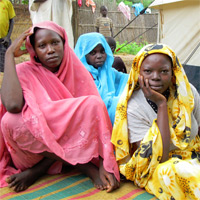
The U.S. has issued so many hollow threats over the past three years that senior National Congress Party, or NCP, officials will dismiss even a clear and direct warning from the President of the United States. President Bush must immediately end the dangerous state of impunity that fuels continued state sponsored violence in Darfur by punishing those same NCP officials.<br /> ...
A Plan B with Teeth for Darfur
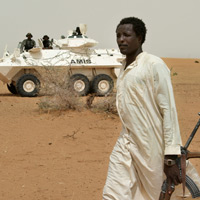
The Government of Sudan has repeatedly ignored threats issued by the Bush administration and the United Nations Security Council. It is clear that the regime does not take these threats seriously, and will continue to flout international opinion until there are specific and escalating costs to its actions ...
Press Release: A Plan B With Teeth For Darfur
In a strategy paper released today, ENOUGH calls on the Bush administration to take resolute action against the Sudanese government for ongoing atrocities in Darfur – by implementing a Plan B with “teeth.” ...
Missing the Point
“What would happen if we thought of Darfur as we do of Iraq, as a place with a history and politics—a messy politics of insurgency and counterinsurgency?” This is the most telling question posed by Professor Mahmood Mamdani in “The Politics of Naming: Genocide, Civil War, Insurgency.” The implication is that the growing public demand for strong international action—military or otherwise—to halt the atrocities in Darfur is somehow unwarranted because people have failed to understand that the systematic crimes against humanity committed against civilians in Darfur (and indeed Iraq) are an inevitability of “the messy politics of insurgency and counterinsurgency.” ...
April Monthly Update — Northern Uganda
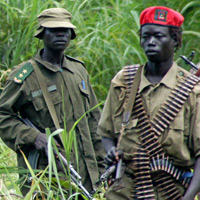
Despite the Lord's Resistance Army’s (LRA) decision in January to withdraw from negotiations in the southern Sudanese city of Juba, diplomatic efforts led by UN Special Envoy Joaquim Chissano persuaded the LRA to return to the table on April 13. Rukhana Rugunda, the Ugandan Government's Internal Affairs Minister and chief mediator, held an unprecedented face to face meeting with the LRA's messianic leader Joseph Kony and his deputy Vincent Otti on March 10, resulting in the agreement to re-start peacemaking efforts. As a result, hope for a peace deal has cautiously rekindled. When the Ugandan government and LRA reconvene in ...
April Monthly Update — Eastern Congo
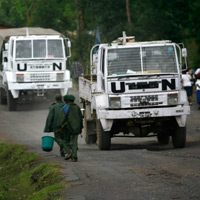
Despite Congo's peace deal and recent national election, armed groups—both national forces and non-governmental militias -- continue to destabilize large swathes of the East. Earlier this year, for example, Congolese militia leader Laurent Nkunda and the Congolese government made peace and agreed to mix their troops, in part to break down Nkunda's command structure and dilute his power. Instead, this integration or "mixage" process has reinforced his strength, rebels of the FDLR (the Rwandan militia which includes elements that committed the 1994 genocide in Rwanda) continue to prey on local Congolese populations, and civilians are paying the price. The army ...
April Monthly Update — Sudan
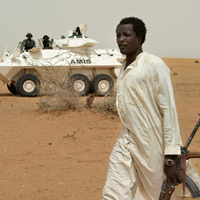
In the absence of tough punitive measures in support of a new peace agreement and the deployment of a more robust international civilian protection force, the outlook for Darfur remains bleak. The last month has seen continued violence against civilians, mounting displacement in Darfur and neighboring Chad, and increased attacks against the African Union peacekeepers in the region. The Khartoum government continues to renege on previous promises to accept the joint United Nations/African Union “hybrid” force supported by the international community. It did accept an interim step that would allow a few thousand UN troops to deploy in support of ...
March Monthly Update — Northern Uganda
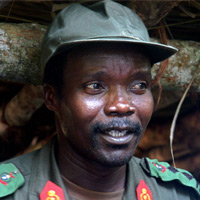
Prospects for peace in Uganda have reached a make-or-break point. After 20 years of civil war across northern Uganda between government forces and the messianic Lord's Resistance Army (LRA) – an infamous conflict marked by widespread massacres, rape and slavery in which 1.7 million members of the ethnic Acholi population were driven from their homes – peace talks are now underway in Juba, southern Sudan. The talks provide northern Ugandans with a chance for lasting peace, but the process is on the verge of collapsing and must be rescued. Currently, the U.S., which probably boasts the most diplomatic leverage over ...
March Monthly Update — Eastern Congo
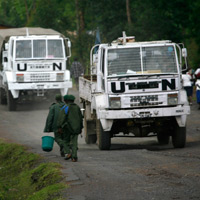
In the aftermath of largely successful elections in the Congo, a core level of violence and insecurity in the east of the country has left the region as one of the deadliest in the world. A recent study by the International Rescue Committee reveals that on average more than 1,000 people die every day due to the conflict. They are caught in a deadly vise between predatory militias, Rwandan and Ugandan rebel groups, and the ill-disciplined and abusive Congolese army. Sporadic violence continues to kill dozens, displace tens of thousands, prevent already displaced families from going back home, and leads ...
March Monthly Update — Sudan
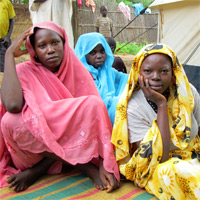
One of the world's hottest wars is intensifying and the people of Darfur are paying the price. A peace agreement between the government of Sudan and one of the Darfur rebel groups was signed in May 2006, but the benefits of this so-called peace have yet to reach the 2.5 million people stuck in displaced camps in Darfur and refugee camps in eastern Chad. Since the signing of the Darfur Peace Agreement (DPA), nearly 200,000 more people have been displaced and an additional two million people need humanitarian assistance because of the havoc that the war has wrought on their ...

